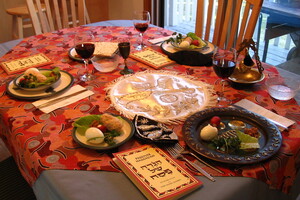The holiday is dedicated to the exodus of Jews from Egypt.

From 15 to 23 April Jews Passover is celebrated – a holiday dedicated to the Exodus from Egypt. It does not have a fixed date, every year the holiday is celebrated on different days.
History of the holiday
The word “Passover” comes from “Passover”, which means “passed, passed by”. The holiday is dedicated to the history of the Exodus from Egypt and the 10th Old Testament. Moses to free the Jews, he and all the people of Egypt were punished. The last of these was the death of all the firstborn in every Egyptian family.
The day before, God commanded the Jews to slaughter lambs and roast meat, and to mark their homes with the blood of sacrificial animals. On the night of Nisan 14, the angel of death “passed by” the Jewish houses, and all the firstborn died in other homes. Pharaoh's son also died.
Pharaoh then decided to release the Jews and 600,000 Israelites left Egypt. However, later Pharaoh changed his mind and sent a chase after the Jews. The Red Sea parted before the Jews, but closed before the Egyptians, who could not persecute this people.
What not to do in Pesach
For all on holidays it is forbidden to eat hamets – flour dishes prepared by fermentation and sourdough. It is believed that when leaving Egypt, the Jews could not wait for the dough to come, so they ate fresh matzoh.
In Pesach, it is forbidden not only to eat ham, but also to keep it at home. Before the holiday it is necessary to do cleaning, eliminating all unwanted products.
On the first and last day of Pesach is forbidden to work.




